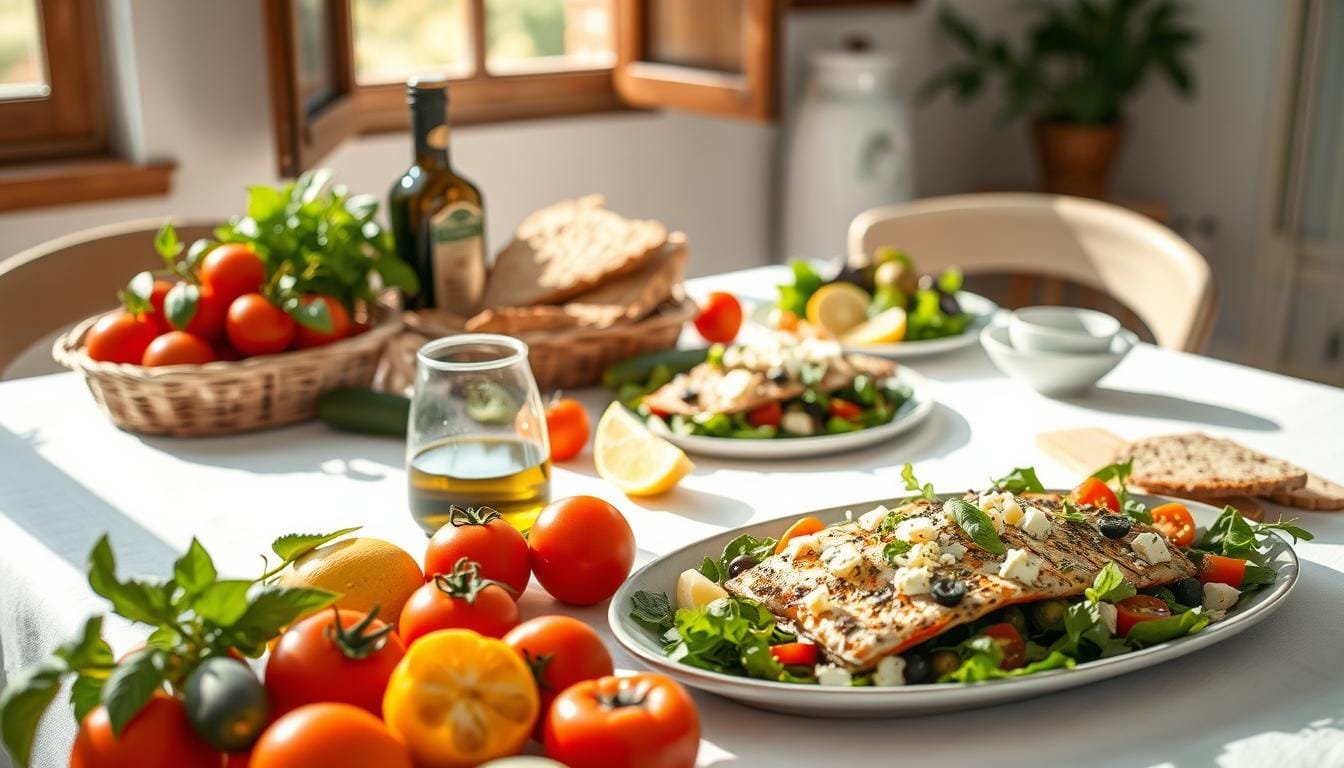Are you ready to embrace a healthier lifestyle? How to start Mediterranean diet plan is an excellent way to shift your eating habits toward a more balanced and nutritious approach. This guide will walk you through the essentials of getting started with the Mediterranean diet, ensuring you feel confident and prepared for your journey.
The Mediterranean diet focuses on whole, unprocessed foods, emphasizing fresh fruits, vegetables, whole grains, and healthy fats like olive oil. It’s not just about meals; it’s a lifestyle that promotes overall well-being. By incorporating lean proteins and reducing calorie intake from unhealthy sources, you can create a flexible eating plan that suits your needs.
Throughout this guide, we’ll explore breakfast ideas, healthy recipes, and practical tips to help you maintain a balanced diet. Whether you’re aiming for weight loss or just want to feel better, how to start Mediterranean diet plan offers a sustainable approach to healthy eating.
Key Takeaways
- The Mediterranean diet emphasizes whole, plant-based foods and healthy fats.
- It promotes a balanced eating pattern rather than strict calorie counting.
- Incorporate fresh fruits, vegetables, whole grains, and lean proteins into your meals.
- Healthy fats like olive oil are central to the diet.
- The plan supports overall health and can be tailored to individual needs.
Understanding the Mediterranean Diet Lifestyle
Embracing the Mediterranean diet is more than just a change in eating habits—it’s a shift toward a healthier, more balanced lifestyle. This approach focuses on whole, unprocessed foods, plenty of vegetables, fruits, and whole grains, along with healthy fats like olive oil.
What the Diet Is All About
The Mediterranean diet is inspired by the traditional eating patterns of countries like Greece and Italy. It’s not a restrictive diet but a way of living that emphasizes fresh, nutrient-dense foods. At its core are vegetables, fruits, whole grains, and healthy fats, which provide sustained energy and support overall well-being.
Cultural and Historical Inspirations
Originating from the Mediterranean region, this diet reflects a deep cultural appreciation for food. Meals are often enjoyed with family and friends, promoting a relaxed approach to eating. The use of olive oil, yogurt, and fresh vegetables is central, creating flavorful and nutritious dishes.
| Mediterranean Diet | Typical Western Diet |
|---|---|
| Emphasizes whole, unprocessed foods | Often includes processed and packaged foods |
| Rich in fruits, vegetables, and whole grains | Lower in fruits and vegetables, higher in refined carbs |
| Uses healthy fats like olive oil | Often relies on saturated fats |
| Encourages moderate portions and mindful eating | May lead to overeating due to high calorie density |
This lifestyle isn’t just about food—it’s about fostering a balanced and enjoyable way of living. By focusing on fresh ingredients and healthy fats, the Mediterranean diet offers a sustainable path to better health and vitality.
Benefits of the Mediterranean Diet for Heart and Brain Health
Discover how this dietary approach can transform your health and wellbeing.
Increased Heart Health and Reduced Risk of Disease
The Mediterranean diet is renowned for its cardiovascular benefits. By focusing on healthy fats like olive oil and reducing saturated fats, it helps lower cholesterol and blood pressure. Studies show it can reduce the risk of heart disease by minimizing plaque buildup in arteries. Incorporating fish and lean meats provides essential proteins that support heart health without the drawbacks of excessive saturated fats.
Improved Cognitive Function and Wellbeing
This diet also supports brain health. Research indicates it may lower the risk of dementia and Alzheimer’s by up to 72%. Foods rich in antioxidants, such as leafy greens and berries, play a crucial role in protecting brain cells. Even small dietary changes can lead to noticeable improvements in memory and energy levels, as many have personally experienced.
| Mediterranean Diet | Typical Western Diet |
|---|---|
| Emphasizes healthy fats like olive oil | Relies on saturated fats and butter |
| Includes fish and lean meats as protein sources | Higher consumption of red meat |
| Linked to reduced heart disease and dementia risks | Associated with higher cardiovascular risks |
Combining the right fats and proteins can lead to a longer, healthier life. The Mediterranean diet offers a balanced approach that supports both heart and brain health, making it a sustainable choice for overall wellbeing.
Key Foods in a Mediterranean Diet
At the heart of the Mediterranean diet lies an abundance of nutrient-dense foods that promote vitality and overall health. This dietary approach celebrates a wide variety of flavors and ingredients, making it both enjoyable and sustainable.
Vegetables, Fruits, and Whole Grains
Fresh vegetables and fruits form the foundation of this diet. Aim for at least 3 servings of vegetables and 2 servings of fruits daily. Whole grains like brown rice, quinoa, and whole-wheat bread are also essential, providing sustained energy and fiber.
Seafood, Healthy Fats, and Legumes
Seafood, especially fatty fish rich in omega-3s, is a key protein source. Healthy fats, particularly extra virgin olive oil, are used liberally for cooking and dressings. Legumes and nuts add protein and fiber, making meals more satisfying.
| Mediterranean Diet Foods | Typical Western Diet Foods |
|---|---|
| Emphasizes whole grains, vegetables, and fruits | Often includes refined carbs and processed foods |
| Uses healthy fats like olive oil | Relies on saturated fats and butter |
| Incorporates seafood and lean proteins | Higher consumption of red meat |
By focusing on these food groups, the Mediterranean diet offers a balanced approach to nutrition, supporting heart health and overall wellbeing.
How to Start Mediterranean Diet Plan: Tips for Beginners
Transitioning to a Mediterranean-inspired eating pattern can feel effortless with the right approach. This step-by-step guide will help you make the shift smoothly, ensuring you enjoy the journey while reaping the benefits of this balanced way of eating.
Step-by-Step Guide to Switching Your Diet
Your first step is to focus on simple substitutions. Replace red meat with fish a couple of times a week and add more plant-based foods to your meals. Incorporating fresh vegetables and whole grains can make a significant difference in the overall quality of your diet.
Planning your meals is key. Start by listing healthy ingredients and setting achievable goals. For example, aim to include a salad with every lunch and add a variety of colorful vegetables to your dinners. Remember, moderation and consistency are essential for long-term success.
Don’t forget the power of olive oil. Use it generously for cooking and as a dressing for your salads. Fresh produce should be the star of your meals, creating balanced and calorie-conscious dishes that are both nourishing and delicious.
Embrace this way of eating while still enjoying familiar foods. With a little creativity, you can adapt your favorite recipes to fit the Mediterranean style, making the transition both enjoyable and sustainable.
Meal Planning for a Mediterranean Diet
Creating a well-structured meal plan is essential for embracing the Mediterranean lifestyle. It helps maintain balance and ensures you’re getting the right nutrients each day.
Creating Balanced Meal Plans
A good meal plan starts with variety. Focus on whole grains, vegetables, and lean proteins. For example, pair whole grain pasta with steamed vegetables and a sprinkle of beans for extra protein and fiber.
Portion Sizes and Serving Goals
Understanding serving sizes is key. Aim for 1/2 cup of grains, 1 cup of vegetables, and 3 ounces of protein per meal. This balance keeps meals satisfying without overeating.
Calorie awareness is important but doesn’t require strict counting. Aim for meals around 300-400 calories for breakfast, 350-450 for lunch, and 400-500 for dinner.
Practical Tips for Meal Planning
- Plan your meals weekly, listing each component to stay organized.
- Incorporate beans for added protein and fiber.
- Use whole grains and lean proteins in every meal for balance.
Good meal planning leads to smarter shopping and healthier choices. It’s about making sustainable, enjoyable changes that fit your lifestyle.
Breakfast Recipes and Ideas
Starting your day with a nutritious breakfast is essential for maintaining energy and focus. Mediterranean breakfasts are not only delicious but also packed with nutrients to keep you going throughout the morning.
Nutritious Options to Kickstart Your Day
A healthy breakfast should be both satisfying and flavorful. Consider starting your day with a bowl of Greek yogurt topped with fresh berries and a sprinkle of granola. This option is high in protein and fiber, making it a great way to begin your day. Alternatively, you could try whole-grain toast topped with mashed avocado and a poached egg for a boost of healthy fats and complex carbohydrates.
Quick and Easy Mediterranean Breakfasts
If you’re short on time, there are still plenty of quick and nutritious options available. One idea is to prepare a batch of egg white omelets with spinach and tomatoes on the weekend, which can be reheated throughout the week. Another option is to keep a bowl of overnight oats in the fridge, made with rolled oats, almond milk, and a touch of honey. These can be topped with fresh fruit and nuts in the morning for added texture and flavor.
For those who prefer something a bit more indulgent, a small amount of butter or a drizzle of extra virgin olive oil can add richness to your breakfast without overdoing it on the calories. Pair these with a slice of whole-grain toast or a side of fresh fruit to keep your meal balanced.

Remember, the key to a successful breakfast is variety and balance. By incorporating a mix of protein, healthy fats, and complex carbohydrates, you’ll be setting yourself up for a day of energy and focus. Whether you prefer something light and simple or hearty and filling, there’s a Mediterranean breakfast option to suit your needs.
Lunch Inspirations for a Mediterranean Diet
Lunch is a great opportunity to refuel with nutrient-dense foods. The Mediterranean diet offers a variety of vibrant and wholesome options to keep you energized throughout the day.
Check This:
- The Mediterranean Diet: Which Countries follow Mediterranean diet
- How to Follow a Mediterranean Diet for Healthy Eating
Simple Salad and Sandwich Ideas
One of the easiest ways to enjoy a Mediterranean-inspired lunch is with a fresh salad. Combine mixed greens, cherry tomatoes, cucumbers, and a sprinkle of feta cheese for a light yet satisfying meal. Add a protein source like grilled chicken or chickpeas to keep it filling. Don’t forget a drizzle of olive oil and a squeeze of lemon juice for added flavor.
For sandwich lovers, whole grain bread is a fantastic base. Try layering sliced cucumbers, spinach, and hummus for a tasty and healthy option. You can also add a sprinkle of olives or artichoke hearts for extra flavor. Pair your sandwich with a side of mixed fruit or a small serving of yogurt for a balanced meal.
| Mediterranean Lunch Options | Nutritional Benefits |
|---|---|
| Falafel sandwich | High in fiber and plant-based protein |
| Quinoa salad bowl | Rich in whole grains and antioxidants |
| Tuna salad with avocado | Excellent source of omega-3 fatty acids |
When preparing your meals, consider portion sizes to maintain a balanced calorie intake. A typical Mediterranean lunch might include a small salad, a slice of whole grain bread, and a serving of protein like grilled fish or eggs. Don’t forget to add a splash of olive oil for that extra burst of flavor.
Meal prepping is a great way to stay on track, even on busy days. Prepare a batch of salads or sandwiches over the weekend and enjoy them throughout the week. This approach not only saves time but also ensures you’re making healthy choices.
Remember, the Mediterranean diet is all about simplicity and versatility. With a few fresh ingredients and some creativity, you can create delicious and nutritious lunches that keep you energized and focused throughout the day.
Dinner Options to Embrace Mediterranean Flavors
As the day winds down, a delicious and nutritious dinner is the perfect way to round off your evening. The Mediterranean diet offers a variety of vibrant and wholesome dinner ideas that are both satisfying and flavorful.
Hearty Entrees and Fresh Side Salads
A typical Mediterranean dinner often features a balance of protein, vegetables, and healthy fats. One of my favorite recipes is a simple grilled salmon dish, seasoned with herbs like thyme and rosemary, served alongside a colorful side salad. The combination of omega-3 rich fish and fresh vegetables creates a meal that’s both nourishing and delicious.
Easy-to-Follow Recipe Ideas
If you’re looking for something hearty, consider a pasta dish made with whole-grain spaghetti, tossed in extra virgin olive oil, and mixed with sautéed vegetables like spinach and cherry tomatoes. Adding a sprinkle of feta cheese or a few olives can elevate the flavors and add texture to your meal.
For a quick and easy option, try a one-pan meal featuring lean meats like chicken or turkey, roasted with a variety of vegetables such as zucchini, bell peppers, and eggplant. Drizzle with olive oil and season with garlic and lemon juice for a burst of flavor.
- Grilled salmon with a side of steamed vegetables
- Vegetable-packed pasta dishes
- Roasted chicken with a mix of colorful vegetables
- Fish-based recipes for a seafood-inspired meal
These dinner ideas not only support long-term health but also bring vibrant flavors to your table, making every meal an enjoyable experience.
Snack and Side Dish Suggestions
Keeping your energy levels steady throughout the day is easy with the right snacks and side dishes. The Mediterranean diet offers a variety of delicious and nutritious options that are perfect for quick bites or accompanying your meals.
Healthy Snacks for Sustained Energy
A handful of nuts or seeds makes for a great snack, providing a boost of healthy fats and protein. Fresh fruit is another excellent choice, offering natural sweetness and essential vitamins. For a satisfying treat, try pairing whole-grain crackers with a small serving of yogurt or a sprinkle of cheese.
Incorporate seeds into your snacks for added crunch and nutrition. A drizzle of olive oil can enhance the flavor of simple recipes like roasted chickpeas or toasted pumpkin seeds. These snacks are not only tasty but also packed with nutrients to keep you energized.
Smart Snacking Tips
Monitoring calorie intake doesn’t mean sacrificing flavor. Opt for low-fat dairy options like yogurt or cheese to satisfy cravings without overindulging. Preparing snacks ahead of time, such as portioning out nuts or cutting up fresh fruit, can help you make healthier choices throughout the day.
A balanced snack should include a mix of protein, healthy fats, and complex carbohydrates. This combination helps maintain energy levels and keeps you focused. Whether you prefer something light like fruit or heartier options like whole-grain toast with avocado, there’s a Mediterranean-inspired snack to suit your needs.

By choosing snacks that align with the Mediterranean diet, you can enjoy delicious and nutritious options that support your overall wellbeing. Remember, the key is to keep things simple, flavorful, and balanced.
Smart Grocery Shopping for the Mediterranean Diet
Grocery shopping is the first step toward a healthier lifestyle. To make the most of your Mediterranean-inspired meals, it’s essential to stock your pantry with the right ingredients. This section will guide you on creating an effective shopping list and finding nutrient-dense foods that align with your dietary goals.
Creating an Effective Shopping List
Start by focusing on whole grains, fresh produce, and lean proteins. Include items like quinoa, brown rice, and whole-grain bread. Don’t forget to add olives, beans, and nuts to your list for healthy fats and protein. Moderation is key, so plan your portions carefully to avoid overbuying and waste.
Tips for Finding Nutrient-Dense Foods
When shopping, read labels to avoid added sugars and unhealthy fats. Stick to the store’s perimeter for fresh vegetables, fruits, and lean meats, then visit the inner aisles for pantry staples. Compare product types and calorie counts to make informed choices. For example, choose canned beans or fish for convenient, budget-friendly options.
By following these tips, you’ll build a balanced and nutritious grocery basket that supports your Mediterranean-inspired eating habits. Remember, smart shopping leads to smarter meals and better health.
Adapting the Mediterranean Diet to Your Lifestyle
Making the Mediterranean diet a part of your daily routine can be simple and rewarding. It’s all about finding a balance that fits your unique needs and preferences. Whether you’re managing special dietary requirements or just looking to make healthier choices, this flexible approach offers plenty of options to suit your way of living.
Incorporating the Diet into Daily Routine
Consistency is key when it comes to adapting the Mediterranean diet. It’s not about perfection at every meal, but rather making small, sustainable changes over many days. For instance, I personally find it helpful to start the day with a bowl of Greek yogurt topped with fresh berries and a sprinkle of granola. This provides a boost of protein and fiber, keeping me energized throughout the morning. Another simple tweak is substituting butter with extra virgin olive oil for cooking and dressings, which adds healthy fats to your meals without extra calories.
Modifications for Special Dietary Needs
One of the best things about the Mediterranean diet is its flexibility. Whether you’re dealing with diabetes, food allergies, or other dietary restrictions, there are ways to adapt the plan to meet your needs. For example, those with dairy allergies can opt for plant-based yogurt alternatives, while individuals managing diabetes can focus on non-starchy vegetables and lean proteins to maintain balanced blood sugar levels. The key is to experiment and find a rhythm that works for you, ensuring that every meal is both nourishing and enjoyable.
Remember, it’s the little adjustments that make a big difference. Whether it’s the way you prepare your food or the amount you serve, small tweaks can lead to significant improvements in your overall health. By staying consistent and embracing a flexible approach, you can enjoy the benefits of the Mediterranean diet while honoring your unique lifestyle and preferences.
Conclusion
Embracing the Mediterranean lifestyle is a powerful step toward a healthier, more vibrant life. By focusing on fresh fruits, vegetables, whole-grain pasta, and nutritious beans, you create a foundation for balanced eating. A modest glass of wine or a touch of butter can enhance flavors while keeping your meals balanced.
Simple, well-planned meals featuring Greek yogurt or fish support overall health and calorie management. Experiment with diverse types of foods like quinoa and colorful vegetables to keep your diet engaging. Remember, this lifestyle is about small, sustainable changes that feel natural and rewarding.
Reflect on the benefits and practical steps you can take today. Whether it’s adding more seeds to your snacks or enjoying a balanced meal with family, every choice brings you closer to a healthier you. Trust in your ability to embrace this lifestyle—it’s a journey worth taking, and every step forward is a celebration of your commitment to better living.
Source Links
- https://www.eatingwell.com/article/291120/mediterranean-diet-for-beginners-everything-you-need-to-get-started/ – Mediterranean Diet for Beginners—How to Get Started
- https://www.healthline.com/nutrition/mediterranean-diet-meal-plan – Mediterranean Diet 101: Meal Plan, Foods List, and Tips

